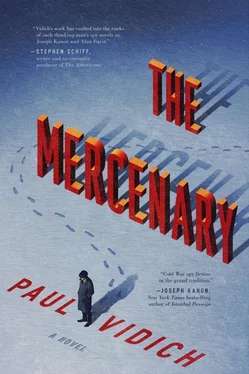“You were rude in the cemetery, and you are still rude. We should forget that we met. It is best for both of us,” she said brusquely. “I will drive you to Golukov. When is a good time? Tomorrow? Noon?”
“And Posner?”
“He is available tomorrow at noon.”
Later, when he remembered the conversation, he recorded his surprise in his notebook. Nothing is ever that easy.
* * *
THE CHANDELIER’S LIGHTS grew brighter, the jazz band played loud jitterbug music, and an opera of voices tried heroically to keep up conversation. The laughter got boozy, and minute by minute the party’s conviviality grew higher in pitch. Groups formed and dissolved, swelling again as new arrivals from the cold warmed to the room’s blazing excitement. Birds chirped in the aviary, and the seal on its melting ice block became languid in the deafening noise, like an intimidated guest. All around, single men wandered, looking morose, and confident girls in long dresses had men following them, offering compliments.
It was just then that Garin heard his name called. He’d taken a position behind the pianist so that he could look out at the room without appearing to observe the crowd. He turned at the sound of his name and saw Ronnie approaching with two flutes of champagne, and being offered one, he accepted it and drank it at once.
“I understand that you successfully managed to annoy the next head of the KGB,” she said. “Congratulations. You’ve got balls.”
“I’ve encountered him before.”
“You’ve met him?” She didn’t hide her surprise.
“Encountered him. He wouldn’t remember.”
A suburban Virginia cul-de-sac in late 1953. Another time, another world. The stranger’s face in a car parked across the street. His mother weeping in the window.
“Years ago,” he said, “but we didn’t meet.”
Ronnie’s smile vanished, and she changed the subject. “I understand your trip to Golukov is arranged.” She raised her flute. “To success.”
Garin tapped a waiter passing with a tray and discharged his empty flute. “Yes, all arranged. Did you have a hand in it?”
“Is that a compliment?”
“It’s not an insult.”
“I’ll take it. Everyone is curious who else is here.” Her eyes were on him. “I’m curious about you. The solitary man always on the sidelines, scheming.”
He nodded but said nothing.
Ronnie’s eyes drifted across the room. “The KGB are here if you know how to spot them.” She pointed at Churgin, who was chatting with Posner. “He doesn’t have wide lapels, thick shoes, cuffed pants, or an ugly tie. That’s the stereotype. But the man who doesn’t look the part is the one you don’t suspect, and he’s the one to watch.”
Garin contemplated Deputy Chairman Churgin, who he had never expected to see again. Velvet anger slowly filled a cold hollow in his chest and he felt the surreal drama of being in the same room with a man he had sworn to kill. His palms moistened at the memory of his oath, but his mind stayed clear. He considered how dangerous an adversary the man might be.
Garin turned back to Ronnie, but she had seized a lime-colored cocktail from the raised tray of a passing waiter, downed it for courage, and stepped onto the dance floor. Her hands moved from her head to her knees, seductively traveling down her swaying hips. Heads turned to look, and the band leader instructed the clarinetist to vary his rhythm following her moves. There was a burst of applause when she completed her passionate tango.
THE NEXT DAY, SHORTLY BEFORE two in the afternoon, under a sky darkened with a slow-moving storm, Natalya and Garin stood outside the bright red door of a dacha made of finely fitted logs caulked with mortar. Except for the wisp of smoke rising straight into the air from a stone chimney, the two visitors had no sign anyone was home. Natalya’s three loud raps on the brass knocker had gone unanswered except for a dog’s tyrannical barking, and she was about to strike a fourth time when a voice inside called out.
“Yes, yes. I am here. Don’t wake the grandchildren.”
The door was thrown open, and an older man, shrunken with age, stood on the threshold, startled and briefly suspicious. He wore coarse wool pants tied at the waist with a cord, a bulky sweater, and sandals with socks. His thinning hair was gray and long, and what he’d lost on his balding head erupted from his ears, giving him the appearance of a hobbit. His eyes widened and his cranky voice hissed, and as he spoke he motioned his visitors forward.
“Natasha, darling. Come in. Come in. The whole winter is entering while you stand there.” He nodded at her feet. “And you didn’t wear boots. You must think you’re still in Moscow. Hurry. Hurry. What a surprise.”
“I called. I left a message with the housekeeper.”
“I got it, but I was in the studio. I forget everything when I’m in the studio. Come in.”
The two-story dacha was penetrated by small windows set deeply in the walls. They kept out the cold and the light. Garin followed Natalya and found himself in a small foyer crowded with boots, coats, hats, and scarves, and passing through, they came to the kitchen. A blue ceramic-tile oven hugged one wall and dominated the room. A short, stocky woman with flushed cheeks vigorously wiped her hands on a cloth apron.
“My housekeeper,” the man said. Having been introduced, the woman smiled self-consciously, revealing a missing tooth.
They passed from the kitchen to the living room, where a monstrous stone fireplace rose two stories and held glowing coals of a dying fire. It was a tall room full of mismatched furniture—a ponderous, claw-footed French Empire sofa faced two rustic wooden chairs, and everywhere the fastidious disorder of a forgetful man. Framed family photographs were propped on an antique breakfront, old copper-plated daguerreotypes of ancient relatives next to snapshots of children.
“This is Vladmir Golukov,” Natalya said, prompting their host to turn.
Golukov looked at Garin, as if for the first time. “And who are you?”
“Aleksander Garin.”
Golukov nodded judgmentally, taking a measure of Garin. “Posner said you want a portrait.” To Natalya, “Why didn’t Posner come?”
“There was a problem,” she replied. “We aren’t here to buy a painting.”
“Then why did you come?”
“To talk.”
“Talk? Sure, I have time for that. Let’s have some slivovitz. Talking is better if we drink.” He added, “You picked a bad day to visit.”
“What’s wrong with today?”
“A big storm is coming. But that won’t bother you. You’re young and foolish. I am old and wise.” He smiled. “And forgetful sometimes. But I’m not too old to enjoy the company of my Natasha.” He winked at Garin. “Beautiful, isn’t she? A gift to the eye.”
“Then you’ve gone blind,” Natalya said. “You spend too much time with your nose on the canvas.”
Golukov whispered confidentially to Garin, “I have several portraits of Stalin you can have for a good price. No one buys him anymore. Lenin, yes. Brezhnev, not so much.” He nodded at Natalya, who had moved ahead. “She scolds me that I go on like an old man, but I tell her I am an old man.”
Golukov led them into a large studio with a stone floor, two skylights, and a woodstove with black piping that penetrated the roof. A large wooden table held tin cans overflowing with brushes, a field of misshapen, partly squeezed tubes of paint, and an ashtray filled with butts. A single easel stood in a rectangle of sunlight. It held an unfinished portrait of a young ballerina seated in a chair, knees apart, elbows on thighs, in a confident pose. Her black hair was tightly wound in a bun, her face was chalk white, and her eyes stared with an insolent expression.
Читать дальше












